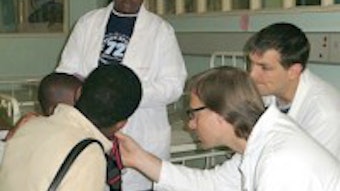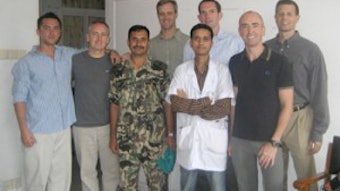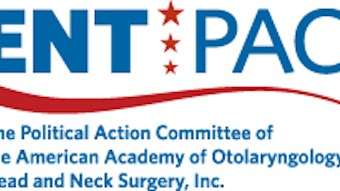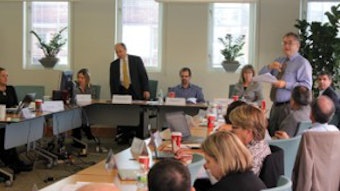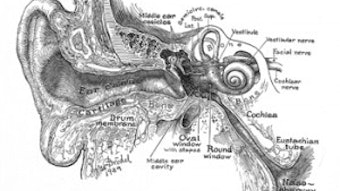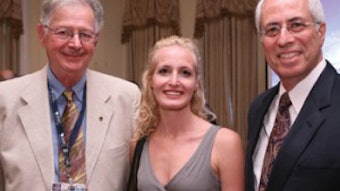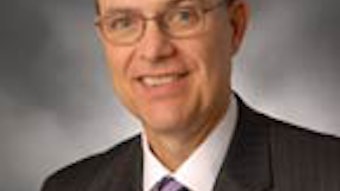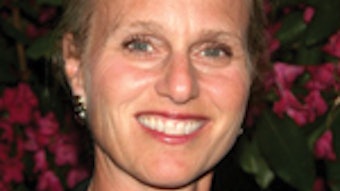Working with Autistic Children in Kazakhstan
James D. Smith, MD Since separating from the Soviet Union in the early 1990s, Kazakhstan, a country with a population of about 15 million, has moved from an agrarian society to an economic one fueled by oil discoveries and other natural resources. As in most mid-level world economies, the wealth is not evenly distributed. In October 2012, I was privileged to join a team giving a conference in Almaty, Kazakhstan, on pediatric neurodevelopment disabilities, specifically autism, cerebral palsy, and developmental delay. Almaty, Kazakhstan’s former capital, has beautiful scenery surrounded by 12,000-15,000-foot snow-capped mountains. The team consisted of a developmental pediatrician; a pediatric neurologist from Astana, Kazakhstan’s current capital, who helped with translation; a speech therapist specializing in working with autistic children; an occupational therapist; a teacher of special needs children; an intern who has her PhD in neurobiology; and myself. Two years ago, we started doing this type of conference at a pediatric hospital in Nairobi, Kenya. It turns out that in many countries children with these disabilities are kept hidden at home, basically receiving few or no services for diagnosis, treatment, or education. In Kenya, on our second visit we were told that the average age of referral for children with disabilities had gone from eight years of age to three. This is a significant change with improved hope for treating these children. After a short visit to Almaty in 2011, Tracy Buckendorf, CCC-SLP, speech pathologist, was invited to return with this team for a week’s conference on pediatric neurodevelopmental disabilities. The initiation and organization came from a parent with a child with autism. Although attempts were made to make the conference known in the medical community, there were only three or four physicians present. Of the nearly 90 attendees, about one-third were parents, one-third special needs teachers, and the rest were speech therapists, physical therapists, psychologists, and psychiatrists. It turns out that the diagnosis and treatment of autism was the biggest draw. We found out that, by law, psychiatrists can only diagnose, but not treat, autism in many former Soviet Union countries. To further complicate early diagnosis and treatment, psychiatrists do not see children younger than four years of age. This means that the early critical period for training these children is missed. In Kazakhstan, we learned that there were fewer than 200 children diagnosed with autism. To further complicate their care, the autism diagnosis is changed to schizophrenia at age 16. Parents become frustrated as they recognize something is wrong, but the pediatricians tell them nothing is wrong. From the Internet they are suspicious that their child has autism, but they have nowhere to turn for help. The feedback from the audience was overwhelmingly positive. Attendees from a neighboring country asked for a team to do the same training next year. Invitations also came from Tajikistan and Azerbaijan when they heard about the conference. What did I learn from this trip? The satisfaction of working with a team of other specialties and other professionals to help educate parents, teachers, and other professionals in an area they were eager to learn more and they saw as a need. I realized first, how fortunate we are to have services for children with disabilities, which in many countries are hidden from society; second, how short-term teams, which provide education and training, can make as much difference in lives as direct patient care. Finally, I realized that sharing with others can be a life-changing activity.
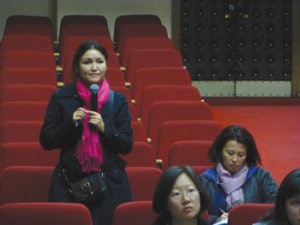 A parent asking questions to the panel about autism.
A parent asking questions to the panel about autism.James D. Smith, MD
Since separating from the Soviet Union in the early 1990s, Kazakhstan, a country with a population of about 15 million, has moved from an agrarian society to an economic one fueled by oil discoveries and other natural resources. As in most mid-level world economies, the wealth is not evenly distributed.
In October 2012, I was privileged to join a team giving a conference in Almaty, Kazakhstan, on pediatric neurodevelopment disabilities, specifically autism, cerebral palsy, and developmental delay. Almaty, Kazakhstan’s former capital, has beautiful scenery surrounded by 12,000-15,000-foot snow-capped mountains.
The team consisted of a developmental pediatrician; a pediatric neurologist from Astana, Kazakhstan’s current capital, who helped with translation; a speech therapist specializing in working with autistic children; an occupational therapist; a teacher of special needs children; an intern who has her PhD in neurobiology; and myself.
Two years ago, we started doing this type of conference at a pediatric hospital in Nairobi, Kenya. It turns out that in many countries children with these disabilities are kept hidden at home, basically receiving few or no services for diagnosis, treatment, or education. In Kenya, on our second visit we were told that the average age of referral for children with disabilities had gone from eight years of age to three. This is a significant change with improved hope for treating these children.
After a short visit to Almaty in 2011, Tracy Buckendorf, CCC-SLP, speech pathologist, was invited to return with this team for a week’s conference on pediatric neurodevelopmental disabilities. The initiation and organization came from a parent with a child with autism.
Although attempts were made to make the conference known in the medical community, there were only three or four physicians present. Of the nearly 90 attendees, about one-third were parents, one-third special needs teachers, and the rest were speech therapists, physical therapists, psychologists, and psychiatrists.
It turns out that the diagnosis and treatment of autism was the biggest draw. We found out that, by law, psychiatrists can only diagnose, but not treat, autism in many former Soviet Union countries. To further complicate early diagnosis and treatment, psychiatrists do not see children younger than four years of age. This means that the early critical period for training these children is missed.
In Kazakhstan, we learned that there were fewer than 200 children diagnosed with autism. To further complicate their care, the autism diagnosis is changed to schizophrenia at age 16. Parents become frustrated as they recognize something is wrong, but the pediatricians tell them nothing is wrong. From the Internet they are suspicious that their child has autism, but they have nowhere to turn for help.
The feedback from the audience was overwhelmingly positive. Attendees from a neighboring country asked for a team to do the same training next year. Invitations also came from Tajikistan and Azerbaijan when they heard about the conference.
What did I learn from this trip? The satisfaction of working with a team of other specialties and other professionals to help educate parents, teachers, and other professionals in an area they were eager to learn more and they saw as a need.
I realized first, how fortunate we are to have services for children with disabilities, which in many countries are hidden from society; second, how short-term teams, which provide education and training, can make as much difference in lives as direct patient care. Finally, I realized that sharing with others can be a life-changing activity.


